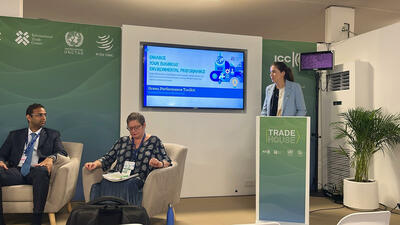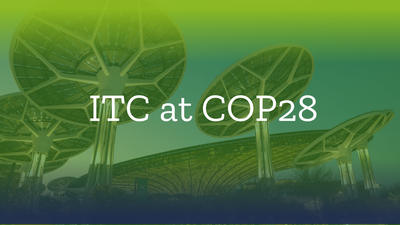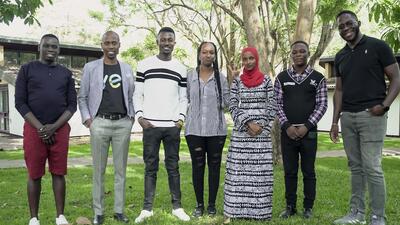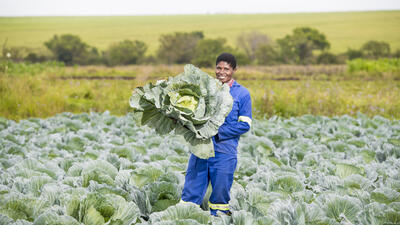

What did COP28 mean for small businesses?
For the first time, the global climate talks featured trade as a theme. The International Trade Centre (ITC) brought the voice of small businesses to the table, including six small businesses and four business support organizations who attended in person.
Small businesses are crucial to drive and support carbon transition, as they represent two thirds of the jobs in the world. They simply cannot be left behind.
These are four key takeaways from Dubai.
- A just transition must be an inclusive one.
The agreement announced for a work plan for Just Transition is significant. So far the global community has mentioned this concept with no further concrete actions. However, climate change is one of the biggest risks facing many small businesses. Their voices need to feature more prominently in these negotiations.
In reality, we cannot talk credibly about making the move to a low-carbon economy without considering the perspectives of small businesses. We also must address the immediate challenges facing developing countries and small island developing states. Women, youth, indigenous people, and members of vulnerable communities are even more at risk. The low-carbon transition must mitigate harm to these countries and businesses, while incentivizing climate action that benefits people, communities, and the planet.
- Small businesses don’t lack climate finance. They lack access to it.
There has been a great deal of talk at COP28 about new financing, although plans and targets remain vague. Small businesses will be interested to know more about the agreed Adaptation Fund, and the scope of the Loss and Damage Fund.
Much of the existing climate finance does not reach those who really need it. Only 1.7% of climate finance goes to small-scale farmers in developing countries. Less than 3% goes to the least developed countries. The 10 countries most affected by climate change receive less than 2% of total climate finance. The perceived riskiness of investing in small businesses is keeping banks and investors from partnering with them. ITC works with small businesses and banks to reduce that trust gap, to enable small businesses to borrow quickly, at affordable rates.
- Small businesses show that they are part of the solution
Small businesses make up 90% of companies worldwide, so their action (or inaction) plays a key role in shaping the low-carbon transition. During panels and discussions with our small businesses and business associations, it was clear they are the change-makers with potential to drive the climate transition. We need to act now to incubate, support and grow these budding ecopreneurs so they can become climate unicorns.
For example – this COP talked about the need to intermesh climate and nature to conserve and restore ecosystems. Shiwi, a woman-owned business in Peru, turns raw materials from protected natural areas into top-quality food. Shiwi uses business practices rooted in biodiversity, which benefit the forests and support local communities. Participatory Ecological Land Use Management (PELUM) in Uganda enhances the livelihoods of small-scale farmers and businesses through ecological land use management. That benefits 12,900 farmers and shapes policies and practices to empower women and youth.
- Climate action needs partnerships
With the best approaches, organizations work and innovate together. Formalization of the Deforestation Goal is seen as a major milestone at COP28, but the devil will be in the detail. For this to work, the change will need to involve communities, businesses, governments, and industry organizations. Each value chain actor will have a shared responsibility to play their part.
ITC’s Alliances for Action approach has piloted sustainable and responsible value chains for cocoa in Ghana and the Dominican Republic, and for coffee in Uganda and Ethiopia. The key to success is to blend consultation, capacity building and collaboration. This includes robust analysis, awareness raising, creation of coordination platforms, and creation of digital tools to showcase compliance. That takes time and resources. More needs to be done now to drive change for tomorrow.
More ITC achievements at COP28
- ITC launched the Green Performance Toolkit, which will allow small businesses to incorporate the benefits of data into their operations.
- Partnerships, partnerships, partnerships: ITC increased its collaborations in various areas.
- Sustainability: ITC was part of a joint centralized database launch in the textile industry.
- Young people: With youth being key to climate action, ITC launched a programme to empower small entrepreneurs.














